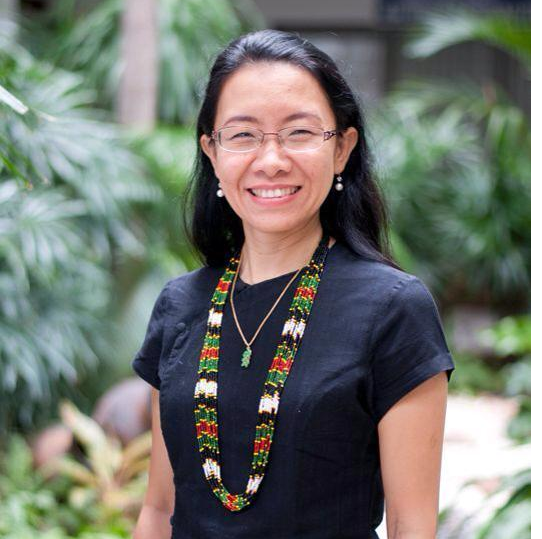
Lwin Lwin Mon
Co-editors: Lilly Seiler & Hans-Bernd Zöllner
Introduction
In 2003, 32 years old Phyu Ei Thein started to consider running a small business after finishing her studies in Japan. This happened in cotogether with Yumiko Ichihara whom she had met at her stay in Japan. She saw many handloom weavers there and got the idea to help them by selling woven products from the region to Japan. From 2006 on, the first textiles were exported.
In early January 2015, the Myanmar Times reported that Phyu Ei Thein had been awarded the „Accelerating Women Entrepreneurship Award“ by the GIZ, the state owned German enterprise operating in international cooperation aiming at sustainable development. More awards should follow.

Two years before getting the award, she had co-founded the Sunflower group in 2012 together with some other loom initiatives that aims to promote Myanmar arts and quality textile products. In 2013, she curated the „Art of Textile and Accessoires, Made in Myanmar“ exhibition at the Lokanat Galleries in Yangon. Shortly later, she offered handicraft training for ethnic Kachin women in one of the many IDP camps for people in Myanmar’s northern Kachin State who had to leave their homes because of the civil war there. In January 2020, she opened the textile Weaving Design Competition of 14 Textile Vocational Training Schools of the whole Myanmar. In early July 2020, one can learn from Facebook that the weaving studio in Nyaung Shwe donated 2000 washable masks with a flower motive to monastic schools and nun schools with the assistance of a Myanmar company.1 The designs had been drafted by various artists.
This enumeration indicates that is not easy to find just a single term that covers her various activities, talents and concerns. She might be called a social inspirer and entrepreneur whose activities are widespread and touch core issues of Myanmar’s politics and social life like the peace process and gender equality.
Biography
Phyu Ei Thein was born in Yangon in 1971. Her father U Maung Maung Thein is a famous art educator and artist called Pathein Maung Maung Thein. Her mother is Daw Mya Mya. Her elder sister Chaw Ei Thein is a well know artist2 living in the USA. She further has two younger brothers, Nay Myo Thein, an artist, and Maung Maung Myo Sane, a graphic designer and co-founder of Mae Latma (Little Thumbling) Weaving Studio in Paungde, located some 220 km north of Yangon in Bago Region.
In 1994, the Sunflower Art Gallery was opened in Yangon’s Sanchaung Kamayut township3 as a family business in which Phyu Ei Thein participated as a curator. The gallery not just displayed pictures of Maung Maung Thein, his eldest daughter and other artists, but offered art courses as well. Already in 1984, art classes for children aged between 6 and 14 had been offered. Later, the paintings of children were shown to the public as well. From 1996-2000, she further was active as a freelance tour guide after attending a training program offered by the Ministry of Hotels and Tourism and very early shared her knowledge of Japanese with others. even before he had started to study at the University.
From 1991 to 1996, she studied Physics at the University of Yangon. Physics because of her interest in science in her childhood. She received B.Sc. (Phys), M.Sc. (Q2), Physics Major Bachelor Degree. After that, she studied Japanese language at Yangon University of Foreign Languages from 1996 to 1998 after already having started to learns the language from 1988 on. She received her diploma in Japanese and proceeded to Japan for further studies from 2000 to 2003 where she continued her studies in Tokyo’s Taisho University and the National University Yokohama in Japanese language and Educational Social Science. Back in Myanmar, she got the idea to work as an official travel guide, but it proved to be difficult to get a job. Therefore, she turned to the textile business. In 2015, she continued her studies in Japan by attending another program as a Researcher in Textile, Weaving & Dyeing, at the Kanazawa College of Art, Kanazawa, Ishikawa Prefecture.
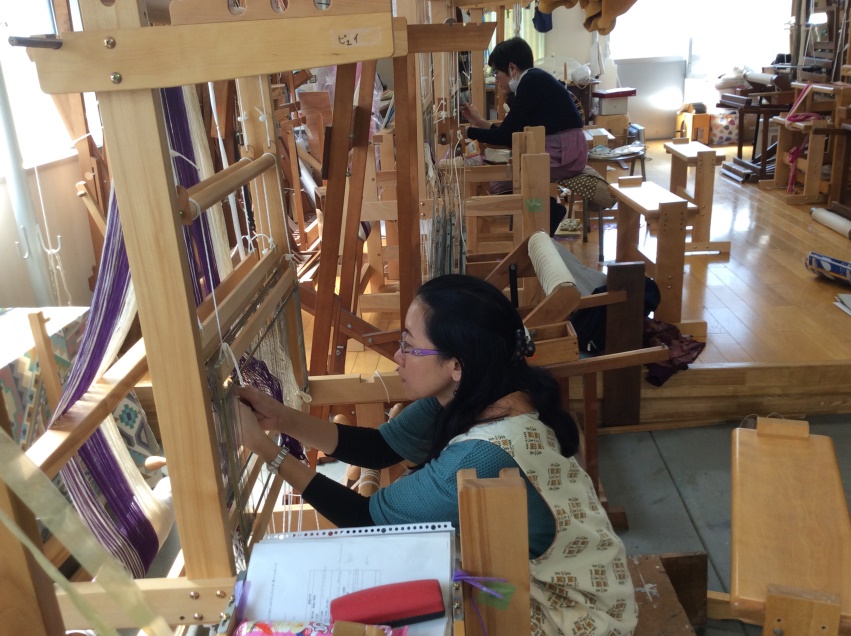
After her return from her first studies in Japan, she founded the Sunflowers Organic Dye Weaving Studio, Nyaung Shwe in Southern Shan State in 2015. This happened after she had visited the place together with Yumiko Ichihara, a teacher she had met during her stay in Japan who was “like a mother to her” as she remembers. They established Myanmar Clothes Co. Ltd. in Japan in 2006.
At the same time, Phyu Ei Thein’s mother, Daw Mya Mya, and sister, Chaw Ei Thein established Naga Land Co. Ltd. in Yangon, Myanmar. A number of local women from Inle lake produced woven fabric using local techniques and designs with chemical dyes. Then, produced clothes in Naga Land Co.Ltd. with those fabric. From 2006 on, the first textiles of Naga Land were exported to Japan and showed in Shimizu Trade Fair in Shizuoka. And Myanmar Clothes Co. Ltd. engaged with JETRO (Japan External Trade Organization) and sell products in One Village One Product(OVOP) Narita Airport and Osaka Airport until now. From 2007 on, Myanmar Clothes Co. Ltd. started to sell natural dye products derived from fruit, roots, flowers and other organic sources. The usually used chemical colours, she realised, polluted the Inle Lake, therefore she decided to use natural dyes that had been in use in the country for a long time.4
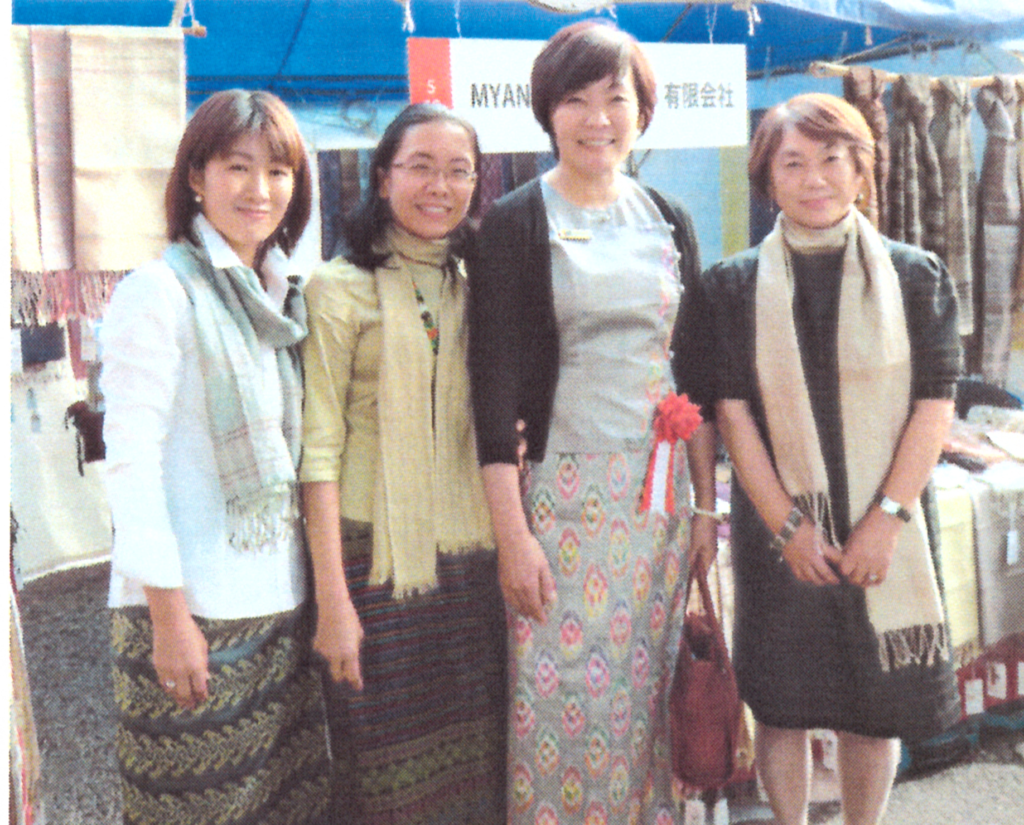
The main aim was to help building a sustainable future for Myanmar’s weavers by making use of traditional skills in combination with innovative techniques. The usually used chemical colours, she realised, polluted the Inle Lake, therefore she decided to use natural dyes that had been in use in the country for a long time. The first products of the new enterprise were sold in various shops in Myanmar and exported to Japan through a company founded for that purpose named “Myanmar Clothes”. The Logo of the company “Yn’P” stands for Yumiko & Phyu. She visits Japan every year and is still in contact with Yumiko.
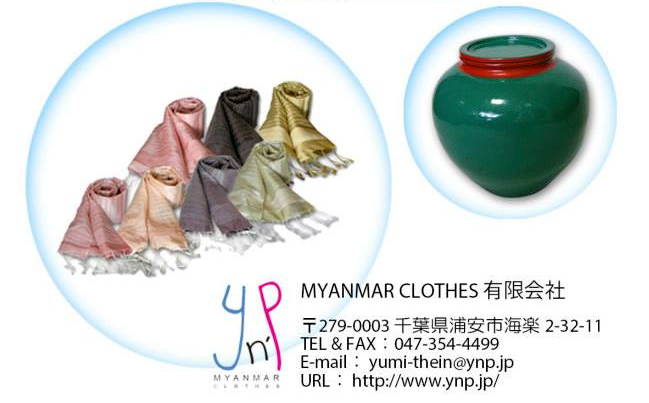
Phyu Ei Thein’s role concentrated on developing, designing clothes and networking in order to promote handloom schools to cope with the need to adapt to the requirements of the market and to help the teaching personal earn a living.. Over the years, the weaving workshop in Nyaung Shwe developed into a centre of a country-wide network of initiatives and like minded people assisting women to earn a living by producing high quality garment products that could be sold both locally and abroad.
From 2014 to 2015, Phyu Ei Thein co-founded the River Ayeyarwady Gallery in Yangon’s 35th Street (Middle Block) together with three other people. The gallery combined art exhibitions on the ground floor of the house and displayed handicraft products on upper floors with a focus of works of handicapped people. The following list illustrates her various activities in cooperation with other agencies:
- Worked as a local coordinator in Research Residency Program and Lat Khat Than (Sound of Weaving) Project of the British Council in partnership with Small Scale Industries Department, the Ministry of Agriculture, Livestock and Irrigation to explore the artisan practices and social conditions of crafts people in Myanmar.
- Gave Natural Dye and Development training of weaving skills in Myanmar’s Dry Zone (Mboutik Program of ActionAid).
- Gave Natural Dye Training in Mudon, Mon State, Program of Ministry of Hotel and Tourism & ADB (Asia Development Bank)
- Gave Development of Women Entrepreneurship Skills, Bago, Metta Foundation
- Working as a National Advisor and Trainer for the Economic Empowerment of the Poor and Women in the East-West Economic Corridor Project with ADB and Ministry of Hotel and Tourism since 2017.
- Worked with Bridge Asia Japan (BAJ) as a local professional expert for UN Women Project in Rakhine State from 2018 to 2019.
- Gave Natural Dye Training in Sittwe, Rakhine State (project of the Lutheran World Federation).
Furthermore, from 2006 on, she worked as a Textile Designer for Myanmar Clothes Co. Ltd, Tokyo. Her advice is sought by a number of government agencies and her activities are shown in the government TV channels MRTV 4 and 7.
Aims and Achievements
At the beginning of the third decade of the 21st century, Phyu Ei Thein is a Myanmar celebrity regarded as one of the women impersonating a bright future of her country in the footsteps of and together with State Counsellor Aung San Suu Kyi. This assessment is mainly founded on her activity as an entrepreneur producing goods that can proudly claim to be “Made in Myanmar”. A book about “Transformative Women Leaders in Myanmar Society” published by the Myanmar Gender Equality Network together with Mizzima Media portrays Phyu Ei Thein under the rubric “business”.5 Such appraisal is correct but covers only a part of what Phyu Ei Thein tried to achieve. She describes herself as a person who wants to promote „social business“ in Myanmar. The following paragraphs deal with some aspects of this aim that is based on her background as a member of a family of artists.
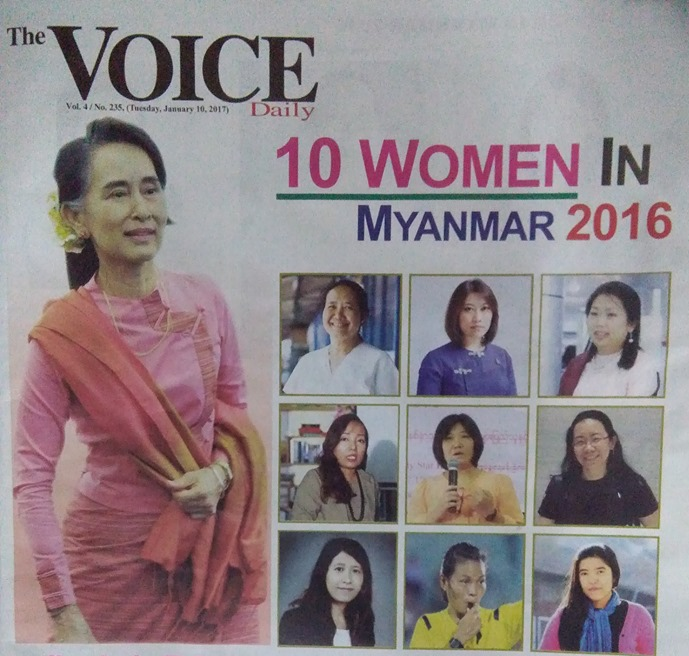
a) „Green“ business.
Phyu Ei Thein’s career began through a combination of her appreciation of the pretty designs produced by weavers at the Inle Lake and her experiences in Japan that helped her to conceive the general idea to export hand-woven silk fabrics to Japan and thus to increase the productivity of the weavers. She established contacts with the Japanese External Trade Organisation (JETRO) that helped to sell the products „Made in Myanmar“ in Japan. As a consequence, the need for quality control and the special feature of Myanmar traditional handicraft had to be combined. Zips were not used and special buttons designed. A special innovation was the use of natural instead of chemical dye that resulted from her observation that the Inle Lake got poisoned and that the loom workshops might contribute to the problem.
b) Communal welfare.
In November 2013, Phyu Ei Thein was interviewed by the Kumudra News Journal about her activity of parahita to people in need. This Pali term can be translated as „welfare for others“ or „community welfare“. In the interview, she shared her idea that she started to perform this activity after she had learned about the meed of socio-economic and political equality in refugee camps in Kachin and Shan States. In December 2001, she attended a painting training at a Monastic Education School in Shwebo, Sagaing Division. One of her friends explained to her about the situation of internal displaced refugees living camps in nearby Kachin State. People did not have enough warm clothes and fuels for fire there during the actual cold season there. When she heard this information, she felt sorry. She remembered this feeling on her next visit to Japan. Weather was very cold there, but her room had a heater and she could enjoy the warmth. She tried to find out how to help and then asked for donations of warm clothes from her Japanese friends and also informed her Yangon friends.
In the end, an initiative named “Helping Hands for Kachin ethnic brothers and sisters living in Kachin refugee camps” participated in the Shwe-da-gon Pagoda Festival. With the help of cartoons and other means, information about the difficulties of ethnic people who suffered from the impact of Civil War was made public. In March 2012, the first group left from Yangon to the Kachin State with donations collected. After her return from Japan and the arrival of the clothes donated there, in the end of April, 2012 she travelled to refugee camps in Kachin State with boxes of clothes and money. She was accompanied by a magician and other donors. When they arrived at the camps, the people were entertained with magic tricks, songs, games and drawing paintings with children. The main intention was temporary stress reduction and building mutual respect and confidence. According to her interview, she shared her experiences from the feedback of the people in the camps as a means to spread the spirit of mutual understanding and the effect of Civil War.
c) Contributing to peace building.
In June 2014 Phyu Ei Thein started yet another project connected to her work in the field of women’s social development and her activities for the people living in the IDP camps. As a response to the precarious situation of Kachin women in refugee camps located in northern Myanmar, Phyu Ei Thein started to offer handicraft training, teaching them to make small pieces of jewellery which can be sold in Yangon and help to provide an income for these women who otherwise do not have the possibility to work. The products are described as high quality, produced with a mix of traditional techniques and some of Phyu Ei Thein’s own ideas and styles. The project’s long term goal is to get those women back on their feet and provide a job opportunity and a steady income for the time they leave the camps. Apart from that Phyu Ei Thein is trying to encourage some of the younger girls without proper education in the camps to attend loom institutes to secure them with long lasting job opportunities. With this project Phyu Ei Thein does not only continues to pursue her work in the field of social entrepreneurship, in working together with people from refugee camps her involvements take on a political dimension in terms of supporting women and gender equality as well as in engaging in what can be called a small scale peace building process. In addition, she supported training fees and expenses for four youths from the camp to attend a vocational traning according to their wishes. :
The following gallery gives an impression of Phyu Ei Thein’s acitivities. From first row, left to second row, right: Volunteer work in a monastic school, 2010; Knitting and Knotting Workshop in Man Wein Gyi IDP Camp, Kachin State (2014); In Kachin State (2016); – Talk about Social Entrepreneurship in the Dry Zone (2018); Natural dye rteaining in the Dry Zone (2018); Basic handicraft skill training (based on fishing net weaving in Oh Taw Cyi IDP canp, Rakhine State (2020)
d) Social Networking.
Another aspect of her performance „social business“ is to help women earning a regular income. The Sunflower group aims at connecting initiatives that cares for more financial security for women. The beginning started in 2007 when Phyu Ei Thein came in contact with the Saunders‘ Weaving and Vocational Institute in Amarapura (near Mandalay) named after a British civil servant who established a training centre in 1914 to spread the power loom technique. Saunders found that the business of hand weaving loom was nearly extinct and made the power loom to become very popular.
Together with the women being trained there, she developed ways of weaving new designs. Then it came into her mind, that the weavers would not be able to concentrate on their work if they were poor. She therefore besides offering technical advice for design, quality production and fair trade paid a basic salary and encouraged local hand-loom weavers and vocational weaving schools to do the same.
She also tries to create more responsible business for the younger generation through the development of community enterprise, with the empowering of young women. She encourages people who are working for the supply chain in the cotton fields, yarn production, natural dyeing, hand weaving and marketing for textile artisans in Myanmar.
Other interesting jobs she does is acting locally and globally as advisor and co-coordinator for collaborating projects. She worked as a local coordinator of the Lat Khat Than Project of British Council that aims at developing a weaving and vocational institute into a Centre of Excellence through an innovative pilot model, which will be adapted to 13 other schools nationwide.
Furthermore, she gave natural dye weaving skill training in Myanmar’s dry zone for a project of Action Aid) as well as in other regions in cooperation with a variety of organisations. among them the Metta Foundation, Ministry of Hotel and Tourism and the Asia Development Bank (ADB).
e) Curating
On September 5, 2017, a special kind of art exhibition kicked off at the National Museum in Yangon named „Lat Khat Than“ like the project of the British Council. It showed products from Myanmar traditional weaving. Phyu Ei Thein helped curating the event and thus tied in with her work at her father’s art gallery. She participated in a number of similar exhibitions like the „3rd Made in Myanmar Exhibition, The Art of Textile & Accessories – 2016”, at the renowned Lokanat Galleries, Yangon. In 2014 she participated in a special event on the occasion of Aung San Suu Kyi’s 69the birthday. Originally, the exhibit planned to put 69 portraits of Suu Kyi on display, some of them pained by her sister. But some more were added later, among them two by the famous artist Khin Maung Yin who had just died shortly before. The exhibition was held at the River Ayeyarwady Gallery co-founded by her. In November 2012 “The Art of Peace” Art Exhibition took place in the Thiri Hall, Royal Rose Restaurant as a fundraising for the victims of the civil war in Kachin State. In Japan, she assisted in holding a number of “Myanmar Art and Crafts” exhibitions from 2006 to 2014.
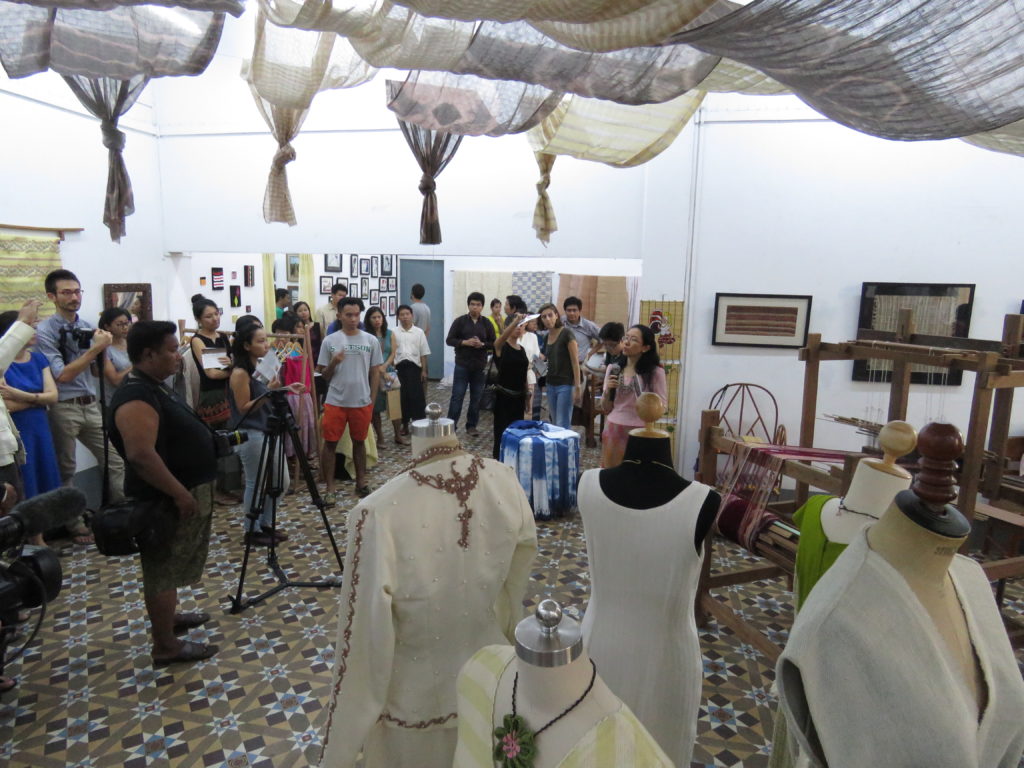
“The Art of Textile & Accessories 3, Made in Myanmar” Exhibition exhibited at the Lokanat Galleries, 2016
Assessment![]()
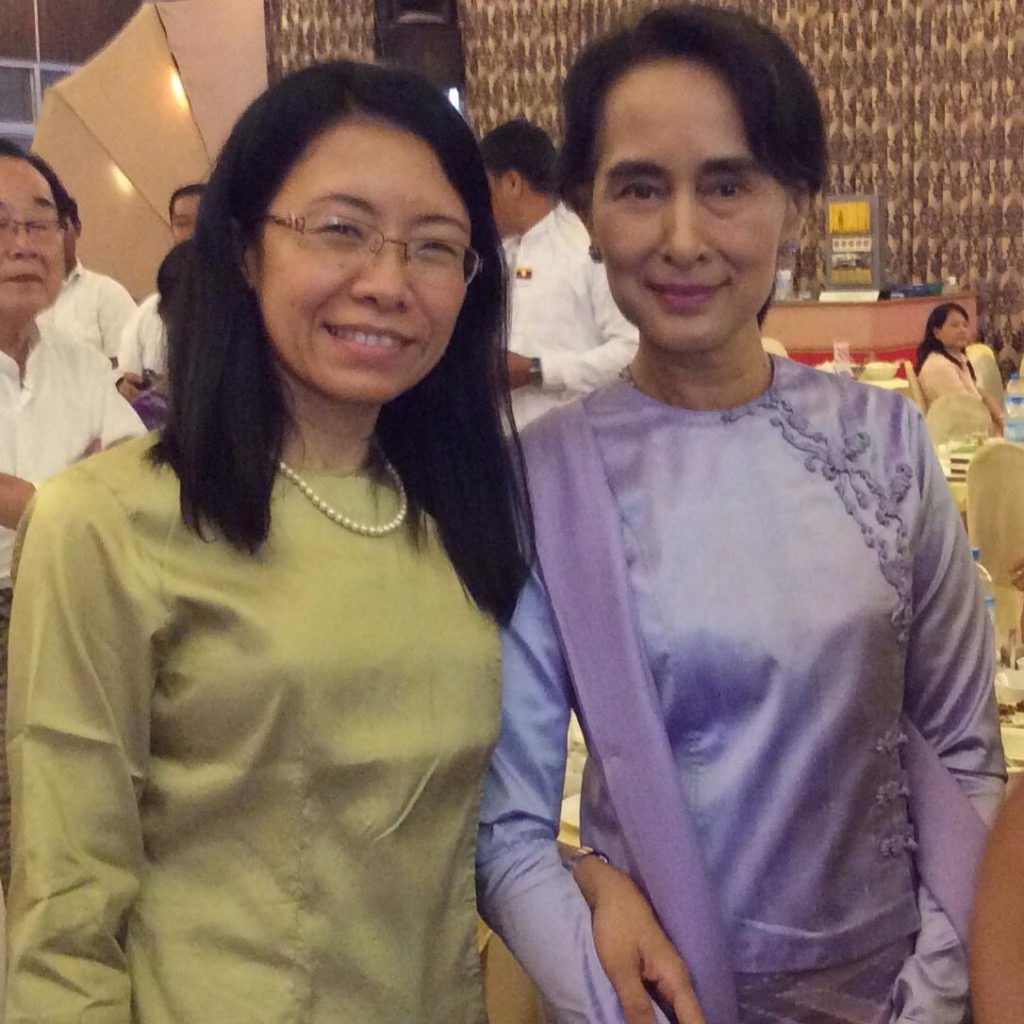
To assess Phyu Ei Thein’s impact is not yet possible, because she is still performing a lot of activities in a number of professional and societal fields that are absolutely not finished yet. Her many activities grew out of the artistic and social traditions of her family that were broadened by her contacts in Japan and her sense for meaningful innovation. She is now widely recognised as one of the outstanding women of contemporary Myanmar. She has been gifted with many talents which she puts at use to empower other women to get a decent salary for their work and thus reduce their dependency within the rather shaky Myanmar labour market. At the same time connecting Myanmar traditional textile crafts with global technology and international trade thus contributing to uplift the reputation of her country that is often characterised as „backward“ in many regards. Her main motivation seems to be rooted in the Burmese-Buddhist tradition of „helping others“ as a practical way of cohering society. Therefore, it is not an accident that a picture showing her together with Aung San Suu Kyi can be found on her Facebook page, to whom Phyu Ei Thein, an outspoken NLD supporter, by her own account maintains a close relationship.
Sources
This biography is based on talks with Phyu Ei Thein during 2019 and 2020. Information provided by people who know her and some sources comes from website and local and international articles and interviews, for example:
Interview with Phyu Ei Thein, Kumudra News Journal, 12 November 2013
Interview ‚The Can Stand on Their Own“, August 26, 2014, Irrawaddy (https://www.irrawaddy.com/in-person/interview/can-stand.html; accessed 17.7.2020)
Interview with Phyu Ei Thein, Popular News, Vol.6, No.49, December 11, 2014
Nandar Aung 2015 Building a sustainable future for Myanmar’s weavers. Myanmar Times 2.1.2015
Gender Equality Network 2018 Transformative Women leaders in Myanmar: 78-84 (https://www.genmyanmar.org/research_and_publications?year=2017; accessed 9.7.2020).
Footnotes
1https://www.facebook.com/photo.php?fbid=10158519040803432&set=pcb.10158519041123432&type=3&theater (accessed 9.7.2020).
2For some more details see http://www.a-i-t.net/en/residency/2016/04/chaw-ei-thien.php
3The gallery and the shop selling sunflower products is located at No. 54 (1st Fl), Shan Gone St, Myenigon, Sanchaung, Yangon, Myanmar.
4Gender Equality Network 2018 Transformative Women leaders in Myanmar (78-84): 78. (https://www.genmyanmar.org/research_and_publications; accessed 9.7.2020).
5The other rubrics are: Peace, Health and Sport, Education, Social and Others. One can argue that Phyu Ei Thein could have been listed under the other rubrics – with the e4xception of “Health and Sports” as well.








